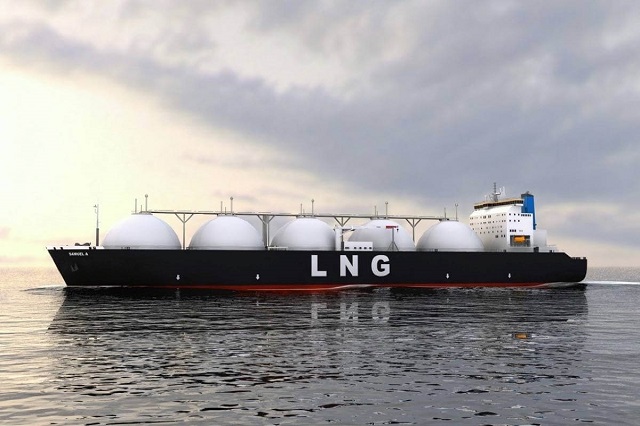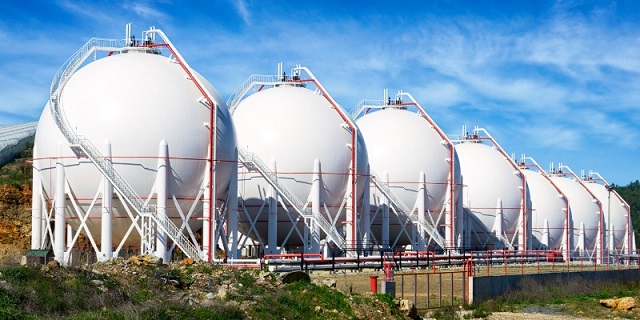Energy
Why Canada should get carbon credits for LNG exports

From the MacDonald Laurier Institute
By Jerome Gessaroli
Generating carbon credits from LNG exports is potentially a cost-effective way to reduce GHGs globally while helping to meet our carbon reduction goals
It stands to reason that Canada should get carbon credits for replacing dirty coal-fired energy sources in Asia with our cleaner natural gas, preventing the release of many megatonnes of greenhouse gas emissions. But as the issue currently stands, we won’t.
However, there’s hope for reason.
A recent paper I wrote for the Macdonald-Laurier Institute sheds light on the confusion surrounding this matter. Based on the 2015 Paris Agreement, specifically Article 6, and the subsequently developed guidelines for the sharing of carbon reduction credits, liquid natural gas exports should be eligible to generate such credits for Canada — just not in a way envisioned by provincial leaders.
Former B.C. premier Christy Clark and successive premiers have argued since 2013 that LNG exports alone should be counted toward carbon credits for Canada and its provinces. Researchers estimate that if Asian countries replace coal with natural gas in their power plants, emissions would fall by 34 to 62 per cent.
However, each time this argument resurfaces, it faces criticism from various quarters.
The confusion over sharing carbon credits arises from the disconnect between the idea’s simplicity and its complex implementation.
Carbon credit eligibility is based on the principle that only emission reduction projects that would not have proceeded without access to carbon credits meet a so-called “additionality” criterion. While there are other criteria, the additionality criterion is the heart of credits sharing regime.
A straightforward LNG export contract with an Asian utility that substitutes gas for coal would probably not be eligible to generate any carbon credits for the Canadian side. While the deal does lower GHG emissions, those reductions are not “additional” and the deal would go ahead with or without the availability of emissions credits.
However, there is another scenario that would likely qualify to receive carbon credits. In this scenario, in addition to selling LNG, the Canadian company helps the Asian utility convert its coal-fuelled plant to a natural gas plant. In this case, the utility’s motivation is to avoid prematurely shuttering its power plant and losing its investment due to stricter emission standards.
On the Canadian side, support may involve providing technical services, financing or other assistance. While more costly for Canada, those extra expenses could be more than offset by the value of carbon credits transferred by the Asian side. Canada would win by accruing revenue from the sale of LNG, providing additional Canadian-based services, and receiving valuable carbon credits to help meet our emissions targets. This deal is “additional” – its feasibility is contingent on its eligibility for carbon credits.
Critics warn that selling LNG abroad will “lock in” fossil fuel use and delay the transition to renewables. The reality is that the average age of Asian coal-fuelled power plants is only 13 years (with a lifespan of up to 40 years) and that over 1,000 new coal plants have been announced, permitted or are currently under construction.
These are the facts, whether we like them or not. This reminds me of the quote often attributed to John Maynard Keynes, “As the facts change, I change my mind. What do you do, sir?” What we can do is assist in switching some of these plants from burning coal to LNG, which will substantially reduce GHG emissions over the short and medium term; not to mention help energy workers keep their jobs.
Critics also assert that producing LNG in British Columbia creates emissions which could prevent the province from meeting its own emission reduction targets. Yet studies estimate that using just over half of LNG Canada’s annual Phase 1 production capacity to replace coal could reduce international GHG emissions by 14 to 34 Mt while increasing yearly emissions in B.C. by less than two megatonnes.
Creating the infrastructure to transfer carbon credits under the Paris Agreement is a complex and relatively new endeavour. Earning carbon credits is also a non-trivial task. It will require the federal government to initiate bilateral agreements and negotiate common policies and practices with any partnering country for calculating, verifying, allocating and transferring credits. Alberta and B.C. are already co-operating.
Generating carbon credits from LNG exports is potentially a cost-effective way to reduce GHGs globally while helping to meet our carbon reduction goals.
Jerome Gessaroli is a senior fellow at the Macdonald-Laurier Institute and leads The Sound Economic Policy Project at the British Columbia Institute of Technology
Energy
Tech giants’ self-made AI energy crisis

For years tech giants have been helping climate catastrophists shut down reliable fossil fuel electricity. Now the grid they’ve helped gut cannot possibly supply their growing AI needs.
|
|
For years tech giants have been helping climate catastrophists shut down reliable fossil fuel electricity, falsely claiming they can be replaced by solar/wind.
Now the grid they’ve helped gut can’t supply their growing AI needs.¹
- For the last decade, tech giants such as Apple, Microsoft, Meta, and Google have, through dedicated anti-fossil-fuel propaganda and political efforts, promoted the shutdown of reliable fossil fuel power plants in favor of unreliable solar and wind.
- Tech giants have propagandized against reliable fossil fuel power plants by falsely claiming to be “100% renewable” and implying everyone could do it. In fact, they have just paid utilities to credit them for others’ solar and wind use and blame others for their coal and gas use.²
- In addition to their “100% renewable” propaganda, tech giants directly endorsed people and policies who shut down reliable fossil fuel power plants.E.g., The RE100 coalition, including Google, Apple, Meta, and Microsoft, advocates for policies to “accelerate change towards zero carbon grids at scale by 2040.”³
- Companies’ propaganda that solar/wind could rapidly replace fossil fuels has proven false.
Statewide blackouts in California (2020) and Texas (2021) were caused by the failure of solar/wind—which can go near zero at any time—to make up for lack of reliable fossil fuel capacity.
- Thanks in significant part to tech giants’ advocacy, we have now shut down enough reliable power plants to be in a nationwide electricity crisis.
For example, most of North America is at elevated/high risk of electricity shortfalls between 2024-2028.⁴
- The anti-fossil-fuel, pro-unreliable solar and wind political climate that tech giants have fostered is getting much worse, as the Administration has pledged to further reduce reliable electricity supply via power plant shutdowns and add artificial demand through EV mandates.
Biden’s EV mandate: a dictatorial attack on the American driver and the US grid
·APR 22Biden’s de facto mandate of over 50% EVs by 2032 is a dictatorial attack on the American driver and the US grid that will 1. Force Americans to drive inferior cars. 2. Place massive new demand for reliable electricity on a grid that is declining in reliable electricity supply.
Read full story - While for years tech giants didn’t seem to have any concern about the electricity supply disaster their propaganda and policies were bringing about, they are now very interested because of the accelerating power requirements of computing, above all the hyper-competitive AI space.
- To function at its potential, AI requires massive amounts of power. E.g., state-of-the-art data centers can require as much electricity as a large nuclear reactor.⁵
- Electricity demand from US data centers already doubled between 2014 and 2023. Now with the fast growth of energy-hungry AI, demand from data centers could triple from 2.5% to 7.5% of our electricity use by 2030, according to Boston Consulting Group.⁶
- In large part due to AI, nationwide electricity demand is projected to skyrocket. Official 10-year projections for the US have summer and winter peak demand rising by over 79 gigawatt and over 90 gigawatt. 90 gigawatt is equivalent to adding the entire power generating capacity of California (!)⁷
- Given the woeful underpowered grid that AI giants have helped bring about, dramatically rising demand from AI will not only contribute to massive electricity shortages, but it will also destroy a lot of potential for AI to occur in the United States.
- Limited and expensive electricity will force data centers to operate with higher cost or lower capacity within the US—or take a performance hit in the form of increased latency (which can drastically reduce the value of the product) by moving offshore.
- Not only is offshoring data centers destructive from an economic standpoint, it also poses a substantial security risk. E.g., Building a data center in China—which we already depend on dangerously for critical minerals—gives the CCP physical power over more parts of our economy.
- Economically, data centers are a gold mine of opportunities.Globally, data centers employed 2M people full-time in 2019, many in high-skill/high-pay jobs—and this number is forecast to increase nearly 300K by 2025.
Our gutted grid will cost many Americans these opportunities.⁸
- In the face of woefully inadequate electricity supply for their AI goals, tech giant CEOs are finally speaking up about the lack of power.
E.g., Meta CEO Mark Zuckerberg said in an interview that energy will be the #1 bottleneck to AI progress.
- It is not enough for tech giants to warn us about the lack of reliable power. They need to take responsibility for their anti-fossil-fuel advocacy that helped caused it. And they need to support energy freedom policies that allow all fuels to compete to provide reliable power.
End preferences for unreliable electricity
·DECEMBER 14, 2022Today’s grids are being ruined by systemic preferences for unreliable electricity: 1) no price penalty for being unreliable 2) huge subsidies for unreliables 3) mandates for unreliables Congress should end these now. The Opportunity America, given its combination of abundant domestic energy resources, technological ingenuity, and free-market competition, has …
Read full story - An example of a tech giant influencer not taking any responsibility for causing the electricity crisis is BlackRock CEO Larry Fink, who pushed companies and governments to adopt “net-zero” policies using mostly solar/wind, but now admits they can’t power AI data centers!
- A better attitude toward electricity was expressed by OpenAI CEO Sam Altman: “There will always be people who wait and sit around and say ‘we shouldn’t do AI because we may burn a little more carbon’… the anti-progress streak” and this “is something that we can all fight against.”⁹
- America faces a choice. We can either continue our current trajectory, descend into a Third World grid, and become totally inhospitable for AI, or we can adopt energy freedom policies and become a world leader in both AI and electricity.
- Share this article with tech giant CEOs and tell them to publicly apologize for damaging our grid and to commit to energy freedom policies.Google: @sundarpichai ([email protected])
Apple: @tim_cook ([email protected])
Meta: @finkd ([email protected])
Microsoft: @satyanadella ([email protected])
Michelle Hung contributed to this piece.
Popular links
- EnergyTalkingPoints.com: Hundreds of concise, powerful, well-referenced talking points on energy, environmental, and climate issues.
- My new book Fossil Future: Why Global Human Flourishing Requires More Oil, Coal, and Natural Gas—Not Less.
- Speaking and media inquiries
“Energy Talking Points by Alex Epstein” is my free Substack newsletter designed to give as many people as possible access to concise, powerful, well-referenced talking points on the latest energy, environmental, and climate issues from a pro-human, pro-energy perspective.
Energy
Federal government continues to reject golden opportunities to export LNG

From the Fraser Institute
By Julio Mejía and Elmira Aliakbari
A recent report released by the National Bank of Canada underscores the potential environmental impact of transitioning from coal to natural gas in countries such as India. According to the report, by 2030 the cumulative effect of this transition would result in up to four times fewer greenhouse gases emissions than what Canada emitted in 2021.
Once again, Canada has missed a crucial opportunity to supply clean and reliable energy to an ally. Polish President Andrzej Duda recently expressed interest in purchasing Canadian liquefied natural gas (LNG) from Canada but the Trudeau government did not offer any concrete commitment in response. We’ve seen this movie before.
During his recent visit to Ottawa, Greek Prime Minister Kyriakos Mitsotakis received the same noncommitment. In January 2023, Japanese Prime Minister Fumio Kishida came to Canada hoping to secure a reliable energy source. In response, Trudeau expressed the importance of Canada as a global energy supplier, only to add the disclaimer that the world is “aggressively” moving towards decarbonization. And in 2022, after Putin’s invasion of Ukraine led Germany to seek ways to reduce its reliance on Russian energy sources, German Chancellor Olaf Scholz asked to buy Canadian LNG but the prime minister gave him the cold shoulder. Apparently, Trudeau found no compelling “business case” to export LNG to Europe’s largest economy.
Of course, Canada’s vast natural resources could make a significant positive impact on global energy security, reliability and emissions reduction by reducing reliance on coal while also creating jobs and economic opportunity here at home. Energy supply shortages have already forced European countries to revert to coal-fired power plants—coal contributes more CO2 emissions per unit of energy than natural gas. In the developing world, India aims to double coal production by 2030 to meet the demands of its burgeoning economy and population. Similarly, China quadrupled the amount of new coal power in 2022 and has six times as many plants under construction as the rest of the world combined.
A recent report released by the National Bank of Canada underscores the potential environmental impact of transitioning from coal to natural gas in countries such as India. According to the report, by 2030 the cumulative effect of this transition would result in up to four times fewer greenhouse gases emissions than what Canada emitted in 2021. To put that in perspective, the impact would be even bigger than completely shutting down the Canadian economy.
Moreover, a recent McKinsey report anticipates an annual increase in global LNG demand of 1.5 per cent to 3 per cent by 2035. And according to the latest report by the International Energy Agency (IEA), limited new LNG production means supply will remain tight. The Biden administration recently halted LNG project approvals, increasing the need for Canada to establish its own infrastructure if we’re to seize the opportunity and become a global LNG supplier.
Unfortunately, Canada currently has no operational LNG export terminals, with the first LNG facility expected to commence exporting by 2025. The Trudeau government has frustrated the development of other LNG terminals, primarily through government regulatory barriers including long approval timelines. The government’s emissions caps on the oil and gas sector and federal Bill C-69 (which added more red tape and complexity to the assessment process for major energy projects) have also created uncertainty and deterred—if not outright prohibited—investment in the sector. Additionally, the British Columbia government’s “CleanBC” plan to reduce greenhouse gas emissions has added more regulation. Not surprisingly, a recent survey revealed that investors identify regulatory uncertainty as a major deterrent to investment in Canada’s oil and gas sector.
With the proper polices in place, Canada could provide an energy alternative to our allies and other coal-consuming countries worldwide. The Trudeau government should acknowledge the environmental benefits of our natural gas resources, reform regulations for energy infrastructure projects so they’re more competitive, and allow our energy industry to be a leading source of clean and reliable energy, for the benefit of Canadians and the environment.
Authors:
-

 Brownstone Institute16 hours ago
Brownstone Institute16 hours agoMedical Elites’ Disgrace Over Ivermectin
-

 National14 hours ago
National14 hours agoDespite claims of 215 ‘unmarked graves,’ no bodies have been found at Canadian residential school
-

 Brownstone Institute9 hours ago
Brownstone Institute9 hours agoThe WHO’s Proposed Pandemic Agreements Worsen Public Health
-

 John Stossel3 hours ago
John Stossel3 hours agoProtecting Free Speech: The Early Warning Signs From Around The World
-

 COVID-196 hours ago
COVID-196 hours agoTrudeau’s public health agency recommends another experimental COVID booster
-

 Health7 hours ago
Health7 hours agoTHE WPATH TAPES: Behind-The-Scenes Recordings Reveal What Top Gender Doctors Really Think About Sex Change Procedures
-

 COVID-1910 hours ago
COVID-1910 hours agoThe New York Times Admits Injuries from COVID-19 Shots
-

 Automotive21 hours ago
Automotive21 hours agoElectric vehicle mandates mean misery all around



















